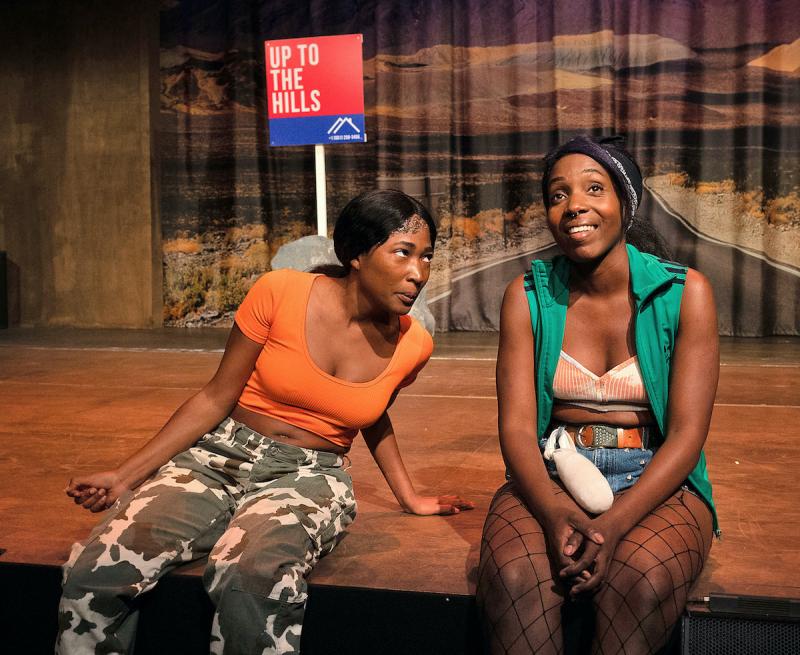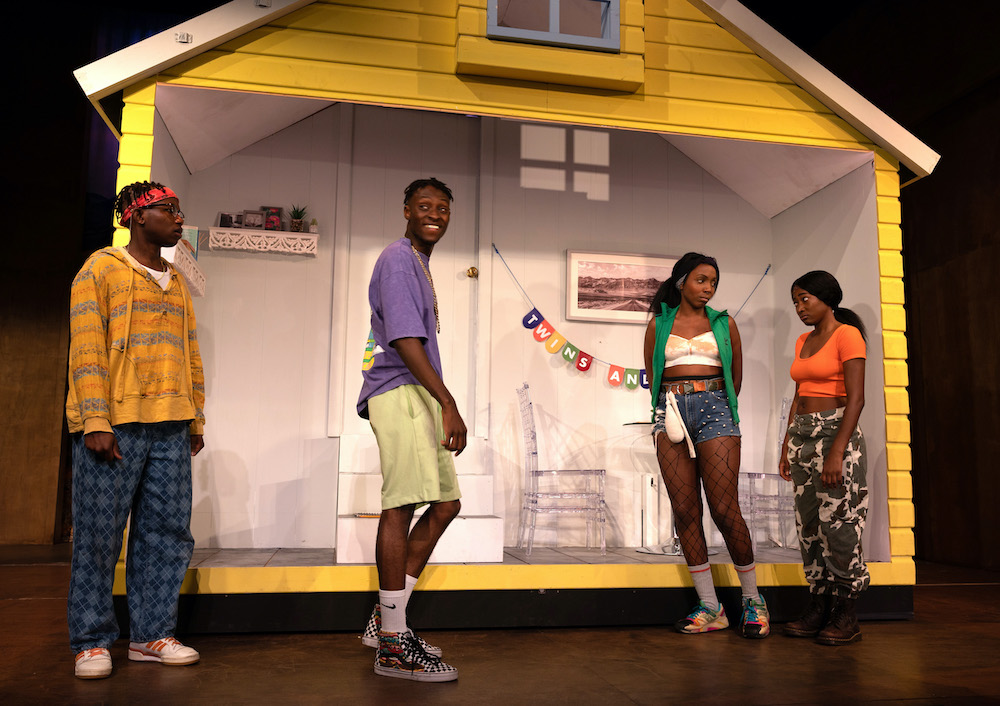Is God Is, Royal Court review – blister, flare and burn, baby, burn | reviews, news & interviews
Is God Is, Royal Court review – blister, flare and burn, baby, burn
Is God Is, Royal Court review – blister, flare and burn, baby, burn
Aleshea Harris’s award-winning play is a thrillingly satirical mash up

God is a tricky one. Or should that be One? And definitely not a He. So when she says take revenge, then vengeance is definitely not only hers, but ours too.
The set up is gloriously surreal. Two 21-year-old twins, Racine the “rough one”, and Anaia, “trapped in a prison of sweetness”, get a letter from their absent mother, who they haven’t seen for some 18 years and believe to have been killed in the same fire that scarred their young bodies. But she survived, and calls herself God. When she summons the twins, they obey, promptly leaving their day-care and warehouse jobs. She commands them to seek out their father, known only as Man, and avenge the fire that has hospitalized her in the “Dirty South” for decades and disfigured the bodies of the twins. He is the guilty one and must be punished.
The next moment we are in a road movie, as Racine and Anaia go West and search for their absent and malignant father. As they hit Los Angeles, Racine arms herself with a large rock in a sock (the rhyme here is typical of the joyously jumpy language) and the twins dispatch Chuck Hall, a suicidal middle-aged lawyer, before arriving at the Man’s home, a yellow house with teak shutters somewhere in the desert. He has two sons, the 16-year-old twins Riley and Scotch, and lives with their mother Angie. The vengeful results of this incursion has echoes of the house of Atreus, mashed up with Webster and Western films, Quentin Tarantino and Martin McDonagh. As the violence escalates, the Hitchcockian murderousness is both hilarious and disturbing.
 There’s an electricity in Harris’s writing, a comic crackle and pop that sizzles and screeches, deliberately treating the heaviest of issues — patricide, recurring violence and the effects of trauma — with the lightest of touches. Only at the end are we encouraged to feel anything, and the reason for this profound levity is that we are, it is implied, all creatures of the spectacle now. Having drunk for decades from the liquor of ultra violence, whether on film or on stage, we are hungover and desensitized. Looking through a darksome glass we see the shadows of entertaining viciousness playing across our retinas. Yep, this is our world, our land of the free.
There’s an electricity in Harris’s writing, a comic crackle and pop that sizzles and screeches, deliberately treating the heaviest of issues — patricide, recurring violence and the effects of trauma — with the lightest of touches. Only at the end are we encouraged to feel anything, and the reason for this profound levity is that we are, it is implied, all creatures of the spectacle now. Having drunk for decades from the liquor of ultra violence, whether on film or on stage, we are hungover and desensitized. Looking through a darksome glass we see the shadows of entertaining viciousness playing across our retinas. Yep, this is our world, our land of the free.
This comic epic reminds us that the fun films we have enjoyed so much for so many decades are really just nasty stories and that what is usually missing is an understanding of trauma. In Harris’s vision, her main characters bear their wounds visibly and her family story pulses with the search for justice. Bad stuff must be avenged. The refreshing thing about the play is its complete scorn for the tropes of black drama. This is a story about African-Americans, and it rings with linguistic virtuosity, that doesn’t mention police brutality, institutional racism or the Atlantic slave trade. It’s a satirical portrait of suburban America whose thrilling fireworks remind me of Branden Jacobs-Jenkins’s An Octoroon.
Ola Ince’s superb production brings out the play’s twisted psychology, and its plot swerves, bursts with life on Chloe Lamford’s set, which has delightfully humorous props, silly rocks and, by contrast, some fiercely blazing pyrotechnics. Tamara Lawrance and Adelayo Adedayo play Racine and Anaia with enormous zest, stressing also the occasional moments of heartbreak. As the other twins, Ernest Kingsley Jnr (Scotch) and Rudolphe Mdlongwa (Riley) (pictured above) are a wonderful contrast. The rest of the cast — Cecilia Noble (God), Mark Monero (Man) and Ray Emmet Brown (Chuck Hall) — are likewise excellent. Is God Is is a blazing revolt against victimhood and a marvellous account of how the meek could well inherit the world.
rating
Explore topics
Share this article
The future of Arts Journalism
You can stop theartsdesk.com closing!
We urgently need financing to survive. Our fundraising drive has thus far raised £49,000 but we need to reach £100,000 or we will be forced to close. Please contribute here: https://gofund.me/c3f6033d
And if you can forward this information to anyone who might assist, we’d be grateful.

Subscribe to theartsdesk.com
Thank you for continuing to read our work on theartsdesk.com. For unlimited access to every article in its entirety, including our archive of more than 15,000 pieces, we're asking for £5 per month or £40 per year. We feel it's a very good deal, and hope you do too.
To take a subscription now simply click here.
And if you're looking for that extra gift for a friend or family member, why not treat them to a theartsdesk.com gift subscription?
more Theatre
 50 First Dates: The Musical, The Other Palace review - romcom turned musical
Date movie about repeating dates inspires date musical
50 First Dates: The Musical, The Other Palace review - romcom turned musical
Date movie about repeating dates inspires date musical
 Bacchae, National Theatre review - cheeky, uneven version of Euripides' tragedy
Indhu Rubasingham's tenure gets off to a bold, comic start
Bacchae, National Theatre review - cheeky, uneven version of Euripides' tragedy
Indhu Rubasingham's tenure gets off to a bold, comic start
 The Harder They Come, Stratford East review - still packs a punch, half a century on
Natey Jones and Madeline Charlemagne lead a perfectly realised adaptation of the seminal movie
The Harder They Come, Stratford East review - still packs a punch, half a century on
Natey Jones and Madeline Charlemagne lead a perfectly realised adaptation of the seminal movie
 The Weir, Harold Pinter Theatre review - evasive fantasy, bleak truth and possible community
Three outstanding performances in Conor McPherson’s atmospheric five-hander
The Weir, Harold Pinter Theatre review - evasive fantasy, bleak truth and possible community
Three outstanding performances in Conor McPherson’s atmospheric five-hander
 Dracula, Lyric Hammersmith review - hit-and-miss recasting of the familiar story as feminist diatribe
Morgan Lloyd Malcolm's version puts Mina Harkness centre-stage
Dracula, Lyric Hammersmith review - hit-and-miss recasting of the familiar story as feminist diatribe
Morgan Lloyd Malcolm's version puts Mina Harkness centre-stage
 Reunion, Kiln Theatre review - a stormy night in every sense
Beautifully acted, but desperately grim drama
Reunion, Kiln Theatre review - a stormy night in every sense
Beautifully acted, but desperately grim drama
 The Code, Southwark Playhouse Elephant review - superbly cast, resonant play about the price of fame in Hollywood
Tracie Bennett is outstanding as a ribald, riotous Tallulah Bankhead
The Code, Southwark Playhouse Elephant review - superbly cast, resonant play about the price of fame in Hollywood
Tracie Bennett is outstanding as a ribald, riotous Tallulah Bankhead
 The Lady from the Sea, Bridge Theatre review - flashes of brilliance
Simon Stone refashions Ibsen in his own high-octane image
The Lady from the Sea, Bridge Theatre review - flashes of brilliance
Simon Stone refashions Ibsen in his own high-octane image
 Romans: A Novel, Almeida Theatre review - a uniquely extraordinary work
Alice Birch’s wildly epic family drama is both mind-blowing and exasperating
Romans: A Novel, Almeida Theatre review - a uniquely extraordinary work
Alice Birch’s wildly epic family drama is both mind-blowing and exasperating
 The Producers, Garrick Theatre review - Ve haf vays of making you laugh
You probably know what's coming, but it's such great fun!
The Producers, Garrick Theatre review - Ve haf vays of making you laugh
You probably know what's coming, but it's such great fun!

Add comment